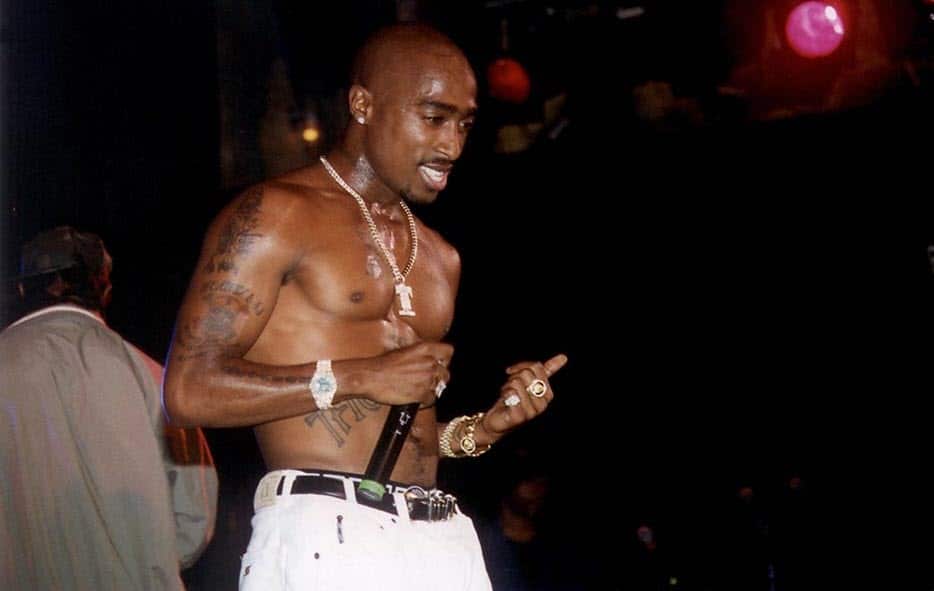Tupac Shakur, known as 2Pac, was a poetic force, transcending music into cultural iconography. Born in 1971, his life was a turbulent journey through poverty, fame, and controversy. As a rapper, actor, and activist, he articulated the struggles of the streets with raw honesty, shaping the landscape of hip-hop. His lyrics, both prophetic and provocative, delved into societal injustices, inner-city strife, and personal demons. Despite his untimely death in 1996, his legacy endures, inspiring generations with his charisma, authenticity, and unyielding spirit. 2Pac remains an indelible symbol of resilience and defiance in the face of adversity.
1. I Ain’t Mad at Cha
“I Ain’t Mad at Cha” is a song by the legendary rapper 2Pac (Tupac Shakur) from his 1996 album “All Eyez on Me.” The song reflects on the struggles and challenges of life, particularly in the context of personal relationships and the choices people make. In the lyrics, 2Pac expresses understanding and forgiveness toward someone who has wronged him, acknowledging the complexities of life and the inevitability of change. The song features a soulful melody and reflective lyrics that resonate with many listeners.
2. Ghetto Gospel
“Ghetto Gospel” is a timeless anthem from Tupac Shakur, blending soulful melodies with profound lyricism. Released posthumously in 2004, the track features Elton John’s iconic piano riff, creating a powerful fusion of hip-hop and gospel influences. Tupac’s verses reflect on the struggles of urban life, offering a poignant commentary on poverty, violence, and hopelessness. Yet, amidst the chaos, there’s a call for redemption and spiritual awakening, as he implores listeners to rise above their circumstances and seek salvation. “Ghetto Gospel” encapsulates Tupac’s ability to speak truth to power, transcending barriers to deliver a message of resilience and faith.
3. Thugz Mansion
“Thugz Mansion” is a soul-stirring track by Tupac Shakur, exploring themes of mortality, redemption, and the pursuit of peace. Originally released in 2002, it features Anthony Hamilton’s emotive vocals and acoustic guitar, creating a hauntingly beautiful backdrop for Tupac’s introspective verses. The song imagines a utopian afterlife, a “Thugz Mansion” where the struggles of the world are left behind and lost loved ones are reunited. Amidst the chaos of life, Tupac reflects on the desire for solace and sanctuary, offering a glimpse into his inner thoughts and aspirations. “Thugz Mansion” stands as a testament to Tupac’s depth as an artist and his yearning for transcendence beyond the confines of mortality.
4. Changes
“Changes” is one of 2Pac’s most famous and impactful songs, released posthumously in 1998 on his album “Greatest Hits.” The song addresses social issues such as racism, police brutality, and the struggle of impoverished communities. Its powerful lyrics reflect on the need for societal change and the challenges faced by marginalized individuals.
In the song, 2Pac raps about the cyclical nature of poverty and violence, criticizing the systemic injustices that perpetuate these problems. He calls for unity and empowerment within communities, advocating for education and positive action as means of overcoming adversity. The chorus, which samples Bruce Hornsby and the Range’s “The Way It Is,” underscores the theme of societal inequality and the urgent need for reform.
“Changes” remains relevant and resonant today, serving as a poignant commentary on enduring social issues and the ongoing fight for justice and equality.
5. Dear Mama
“Dear Mama” is a heartfelt tribute by 2Pac to his mother, Afeni Shakur. Released in 1995 on his album “Me Against the World,” the song showcases 2Pac’s deep love and appreciation for his mother despite the struggles they faced growing up.
In the song, 2Pac reflects on the sacrifices his mother made to provide for him and his siblings, expressing gratitude for her unwavering love and support. He acknowledges her resilience in the face of adversity, including addiction and poverty, and credits her with shaping him into the person he has become. The lyrics paint a vivid picture of their relationship and highlight the profound influence his mother had on his life.
“Dear Mama” is celebrated for its emotional honesty and raw authenticity, resonating with listeners who can relate to the complexities of familial love and the bond between a mother and her child. It remains one of 2Pac’s most beloved and enduring songs, revered for its poignant portrayal of maternal love and the struggles of single parenthood.
6. California Love
“California Love” is an electrifying anthem by Tupac Shakur, featuring Dr. Dre and Roger Troutman, released in 1995. With its infectious G-funk beat and catchy chorus, the song captures the essence of West Coast hip-hop culture. Tupac’s charismatic delivery and Dre’s production prowess combine to create an irresistible party vibe. Lyrically, the track celebrates the hedonistic lifestyle of California, with references to sunshine, palm trees, and lavish parties. However, it also addresses the darker realities of gang violence and social inequality. “California Love” became an instant classic, embodying the spirit of the Golden State while showcasing Tupac’s lyrical prowess and larger-than-life persona.
7. Hit ‘Em Up
“Hit ‘Em Up” is one of 2Pac’s most infamous and controversial tracks, released in 1996 as a diss track targeting several East Coast rappers, most notably The Notorious B.I.G., and his group, Junior M.A.F.I.A.
The song is characterized by its aggressive lyrics and confrontational tone, with 2Pac taking aim at his rivals with insults and threats. He accuses them of various transgressions, including stealing his style, betraying him, and disrespecting him in their music.
“Hit ‘Em Up” is known for its intense and explicit content, including graphic descriptions of violence and explicit language. It sparked a highly publicized feud between the East Coast and West Coast hip-hop communities, contributing to the notorious East Coast-West Coast rivalry that ultimately led to the deaths of both 2Pac and The Notorious B.I.G.
Despite the controversy surrounding its release, “Hit ‘Em Up” remains a significant and influential track in hip-hop history, showcasing 2Pac’s ferocious lyrical prowess and the intensity of his personal and musical conflicts.
8. Ambitionz Az a Ridah
“Ambitionz Az a Ridah” is a high-octane anthem by Tupac Shakur, released in 1996 as the opening track of his album “All Eyez on Me.” The song is driven by a hard-hitting beat and a menacing synth melody, setting the tone for the album’s raw energy and unapologetic attitude. Tupac’s aggressive flow and defiant lyrics proclaim his ambition and resilience in the face of adversity. He reflects on his tumultuous life and the struggles of the streets, while asserting his dominance and determination to succeed by any means necessary. “Ambitionz Az a Ridah” showcases Tupac at the height of his powers, exuding confidence and charisma as he solidifies his status as a rap icon.
9. All Eyez on Me
“All Eyez on Me” is the fourth studio album by 2Pac, released in 1996 on Death Row Records. It is considered one of his most iconic and influential works, and it marked his return to recording after his release from prison in 1995.
The album is a double-disc set, featuring a wide range of musical styles and themes. It includes tracks that address social issues such as poverty, racism, and police brutality, as well as songs that celebrate the gangster lifestyle and the joys of fame and success.
The title track, “All Eyez on Me,” serves as an anthem for 2Pac’s unapologetic approach to life and his rise to fame. Other notable tracks include “California Love,” featuring Dr. Dre, which became one of 2Pac’s biggest hits, and “Ambitionz Az a Ridah,” which showcases his signature aggressive flow.
“All Eyez on Me” received widespread acclaim from critics and audiences alike, and it was a commercial success, debuting at number one on the Billboard 200 chart. It is regarded as a classic of the hip-hop genre and a defining album of the 1990s. Tragically, it was also 2Pac’s final studio album released during his lifetime, as he was killed in a drive-by shooting just months after its release.
10. Life Goes On
“Life Goes On” is a poignant reflection on mortality and the cyclical nature of existence by Tupac Shakur, released posthumously in 1996 on his album “All Eyez on Me.” The track, built around a melancholic piano loop, features Tupac reminiscing about lost friends and loved ones, acknowledging the pain of their absence while finding solace in the memories they left behind. Despite the tragedies and hardships depicted in the lyrics, there’s a sense of resilience and acceptance as Tupac emphasizes the need to keep moving forward in the face of adversity. “Life Goes On” stands as a testament to Tupac’s introspective depth and his ability to find meaning and strength in the midst of life’s struggles.
This post was originally published on this site be sure to check out more of their content.








